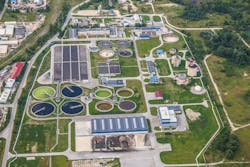International Scientists Harvest Renewable Energy From Wastewater Treatment
A team of international scientists led by the University of Exeter found a method to incorporate ecological processes in wastewater treatment facilities. The new technique is called REPURE and seeks to turn carbon, phosphorus and nitrogen byproducts into renewable energy. The system leverages both artificial and natural systems to create sustainable materials.
Published in the journal Science Advances, the scientists believe their REPURE system could eliminate the need for energy consumption in wastewater treatment and greatly reduce the carbon footprint of wastewater systems. Currently, wastewater treatment represents about 3.4% of the total energy consumption in the U.S. and it is possible that roughly 20% of the global demand for phosphate could be met by recovering phosphorus from waste, according the news source Earth.
“Our REPURE design includes the carbon capture and nutrient retention services provided by soils, as they were found to help reduce adverse environmental effects during the land use of the biosolids and reclaimed water,” Xu Wang, the study’s co-author and a professor at Exeter University explained. “More importantly, this new design can be promoted in many places, as soil is a major component of the planet and exists in nearly every country.”
Learn more about the developing study in the researcher's report on Science Advances.
